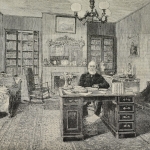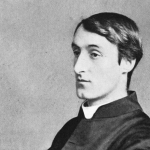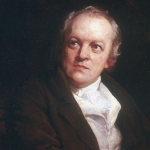Hamelin Town's in Brunswick,
By famous Hanover city;
The river Weser, deep and wide,
Washes its wall on the southern side;
A pleasanter spot you never spied;
But, when begins my ditty,
Almost five hundred years ago,
To see the townsfolk suffer so
From vermin, was a pity.
Rats!
They fought the dogs, and killed the cats,
And bit the babies in the cradles,
And eat the cheeses out of the vats,
And licked the soup from the cooks' own ladles,
Split open the kegs of salted sprats,
Made nests inside men's Sunday hats,
And even spoiled the women's chats
By drowning their speaking
With shrieking and squeaking
In fifty different sharps and flats.
At last the people in a body
To the Town Hall came flocking:
'Tis clear, cried they, our Mayor's a noddy;
And as for our Corporation — shocking
To think we buy gowns lined with ermine
For dolts that can't or won't determine
What's like to rid us of our vermin!
Rouse up, Sirs! Give your brains a racking
To find the remedy we're lacking,
Or, sure as fate, we'll send you packing!
At this the Mayor and Corporation
Quaked with a mighty consternation.
An hour they sate in council,
At length the Mayor broke silence:
For a guilder I'd my ermine gown sell;
I wish I were a mile hence!
It's easy to bid one rack one's brain —
I'm sure my poor head aches again
I've scratched it so, and all in vain.
Oh for a trap, a trap, a trap!
Just as he said this, what should hap
At the chamber door but a gentle tap?
Bless us, cried the Mayor, what's that?
(With the Corporation as he sate,
Looking little though wondrous fat);
Only a scraping of shoes on the mat?
Anything like the sound of a rat
Makes my heart go pit-a-pat!
Come in! — the Mayor cried, looking bigger:
And in did come the strangest figure!
His queer long coat from heel to head
Was half of yellow and half of red;
And he himself was tall and thin,
With sharp blue eyes, each like a pin,
And light loose hair, yet swarthy skin,
No tuft on cheek nor beard on chin,
But lips where smiles went out and in —
There was no guessing his kith and kin!
And nobody could enough admire
The tall man and his quaint attire:
Quoth one: It's as my great-grandsire,
Starting up at the Trump of Doom's tone,
Had walked this way from his painted tombstone!
He advanced to the council-table:
And, Please your honours, said he, I'm able,
By means of a secret charm, to draw
All creatures living beneath the sun,
That creep, or swim, or fly, or run,
After me so as you never saw!
And I chiefly use my charm
On creatures that do people harm,
The mole, and toad, and newt, and viper;
And people call me the Pied Piper.
(And here they noticed round his neck
A scarf of red and yellow stripe,
To match with his coat of the self-same cheque;
And at the scarf's end hung a pipe;
And his fingers, they noticed, were ever straying
As if impatient to be playing
Upon this pipe, as low it dangled
Over his vesture so old-fangled.)
Yet, said he, poor piper as I am,
In Tartary I freed the Cham,
Last june, from his huge swarms of gnats;
I eased in Asia the Nizam
Of a monstrous brood of vampyre-bats:
And, as for what your brain bewilders,
If I can rid your town of rats
Will you give me a thousand guilders?
One? fifty thousand! — was the exclamation
Of the astonished Mayor and Corporation.
Into the street the Piper stept,
Smiling first a little smile,
As if he knew what magic slept
In his quiet pipe the while;
Then, like a musical adept,
To blow the pipe his lips he wrinkled,
And green and blue his sharp eyes twinkled,
Like a candle-flame where salt is sprinkled;
And ere three shrill notes the pipe uttered,
You heard as if an army muttered;
And the muttering grew to a grumbling;
And the grumbling grew to a mighty rumbling;
And out of the houses the rats came tumbling.
Great rats, small rats, lean rats, brawny rats,
Brown rats, black rats, grey rats, tawny rats,
Grave old plodders, gay young friskers,
Fathers, mothers, uncles, cousins,
Cocking tails and pricking whiskers,
Families by tens and dozens,
Brothers, sisters, husbands, wives —
Followed the Piper for their lives.
From street to street he piped advancing,
And step for step they followed dancing,
Until they came to the river Weser
Wherein all plunged and perished
— Save one who, stout as Julius Caesar,
Swam across and lived to carry
(As he the manuscript he cherished)
To Rat-land home his commentary,
Which was, At the first shrill notes of the pipe,
I heard a sound as of scraping tripe,
And putting apples, wondrous ripe,
Into a cider-press's gripe:
And a moving away of pickle-tub-boards,
And a leaving ajar of conserve-cupboards,
And a drawing the corks of train-oil-flasks,
And a breaking the hoops of butter-casks;
And it seemed as if a voice
(Sweeter than by harp or by psaltery
Is breathed) called out, Oh rats, rejoice!
The world is grown to one vast drysaltery!
'So munch on, crunch on, take your nuncheon,
'Breakfast, supper, dinner, luncheon!
And just as one bulky sugar-puncheon,
Ready staved, like a great sun shone
Glorious scarce an inch before me,
Just as methought it said, Come, bore me!
— I found the Weser rolling o'er me.
You should have heard the Hamelin people
Ringing the bells till they rocked the steeple;
Go, cried the Mayor, and get long poles!
Poke out the nests and block up the holes!
Consult with carpenters and builders,
And leave in our town not even a trace
Of the rats! — when suddenly up the face
Of the Piper perked in the market-place,
With a, First, if you please, my thousand guilders!
A thousand guilders! The Mayor looked blue;
So did the Corporation too.
For council dinners made rare havock
With Claret, Moselle, Vin-de-Grave, Hock;
And half the money would replenish
Their cellar's biggest butt with Rhenish.
To pay this sum to a wandering fellow
With a gipsy coat of red and yellow!
Beside, quoth the Mayor with a knowing wink,
Our business was done at the river's brink;
We saw with our eyes the vermin sink,
And what's dead can't come to life, I think.
So, friend, we're not the folks to shrink
From the duty of giving you something for drink,
And a matter of money to put in your poke;
But, as for the guilders, what we spoke
Of them, as you very well know, was in joke.
Beside, our losses have made us thrifty;
A thousand guilders! Come, take fifty!
The Piper's face fell, and he cried,
No trifling! I can't wait, beside!
I've promised to visit by dinner time
Bagdat, and accept the prime
Of the Head Cook's pottage, all he's rich in,
For having left, in the Caliph's kitchen,
Of a nest of scorpions no survivor —
With him I proved no bargain-driver,
With you, don't think I'll bate a stiver!
And folks who put me in a passion
May find me pipe after another fashion.
How? cried the Mayor, d'ye think I'll brook
Being worse treated than a Cook?
Insulted by a lazy ribald
With idle pipe and vesture piebald?
You threaten us, fellow? Do your worst,
Blow your pipe there till you burst!
Once more he stept into the street;
And to his lips again
Laid his long pipe of smooth straight cane;
And ere he blew three notes (such sweet
Soft notes as yet musician's cunning
Never gave th'enraptured air)
There was a rustling, that seem'd like a bustling
Of merry crowds justling at pitching and hustling,
Small feet were pattering, wooden shoes clattering,
Little hands clapping, and little tongues chattering,
And, like fowls in a farm-yard when barley is scattering,
All the little boys and girls,
With rosy cheeks and flaxen curls,
And sparkling eyes and teeth like pearls,
Tripping and skipping, ran merrily after
The Mayor was dumb, and the Council stood
As if they were changed into blocks of wood,
Unable to move a step, or cry
To the children merrily skipping by —
Could only follow with the eye
That joyous crowd at the Piper's back.
But how the Mayor was on the rack,
And the wretched Council's bosoms beat,
As the Piper turned from the High Street
To where the Weser rolled its waters
Right in the way of their sons and daughters!
However he turned from South to West,
And to Coppelburg Hill his steps addressed,
And after him the children pressed;
Great was the joy in every breast.
He never can cross that mighty top!
He's forced to let the piping drop,
And we shall see our children stop!
When, lo, as they reached the mountain's side,
A wondrous portal opened wide,
As if a cavern was suddenly hollowed;
And the Piper advanced and the children follow'd,
And when all were in to the very last,
The door in the mountain side shut fast.
Did I say, all? No! One was lame,
And could not dance the whole of the way;
And in after years, if you would blame
His sadness, he was used to say, —
It's dull in our town since my playmates left!
I can't forget that I'm bereft
Of all the pleasant sights they see,
Which the Piper also promised me;
For he led us, he said, to a joyous land,
Joining the town and just at hand,
Where waters gushed and fruit-trees grew,
And flowers put forth a fairer hue,
And every thing was strange and new;
The sparrows were brighter than peacocks here,
And their dogs outran our fallow deer,
And honey-bees had lost their stings,
And horses were born with eagles' wings:
And just as I felt assured
My lame foot would be speedily cured,
The music stopped and I stood still,
And found myself outside the Hill,
Left alone against my will,
To go now limping as before,
And never hear of that country more!
Alas, alas for Hamelin!
There came into many a burgher's pate
A text which says, that Heaven's Gate
Opes to the Rich at as easy a rate
As the needle's eye takes a camel in!
The Mayor sent East, West, North, and South,
To offer the Piper, by word of mouth,
Wherever it was men's lot to find him,
Silver and gold to his heart's content,
If he'd only return the way he went,
And bring the children behind him.
But when they saw 'twas a lost endeavour,
And Piper and dancers were gone for ever,
They made a decree that lawyers never
Should think their records dated duly
If, after the day of the month and year,
These words did not as well appear,
"And so long after what happened here
"On the Twenty-second of July,
"Thirteen hundred and Seventy-six:"
And the better in memory to fix
The place of the Children's last retreat,
They called it, The Pied Piper's Street —
Where any one playing on pipe or tabor
Was sure for the future to lose his labour.
Nor suffered they Hostelry or Tavern
To shock with mirth a street so solemn;
But opposite the place of the cavern
They wrote the story on a column,
And on the Great Church Window painted
The same, to make the world acquainted
How their children were stolen away;
And there it stands to this very day.
And I must not omit to say
That in Transylvania there's a tribe
Of alien people who ascribe
The outlandish ways and dress
On which their neighbours lay such stress
To their fathers and mothers having risen
Out of some subterraneous prison
Into which they were trepanned
Long time ago in a mighty band
Out of Hamelin town in Brunswick land,
But how or why, they don't understand.
So, Willy, let you and me be wipers
Of scores out with all men — especially pipers:
And, whether they pipe us from rats or from mice,
If we've promised them aught, let us keep our promise.















Comment form: